Below the Breadline: The Increase of Poverty Throughout the UK
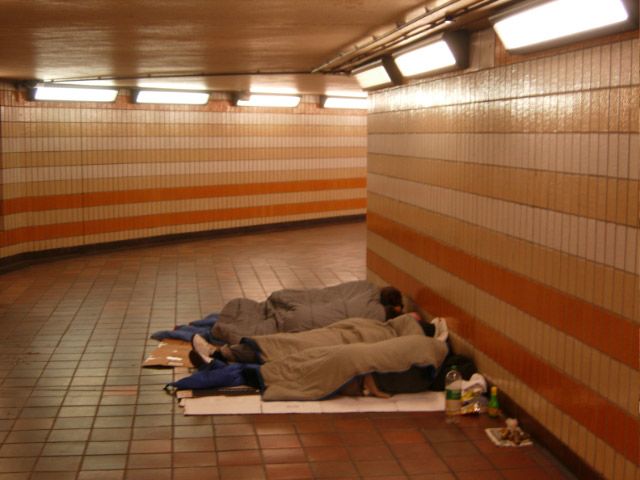
Events of the 2020s have helped contribute to a record-breaking increase in the amount of people living in absolute poverty.
The COVID-19 Pandemic, the cost-of-living crisis and the impact of the war in Ukraine have seen the UK's absolute poverty rate climb to a staggering 12 million people in 2022-23 with figures expected to rise not fall up until 2025.
Within the capital city, child poverty reached 700,000 in 2021/22, approximately a third of all children in the capital are currently in poverty.
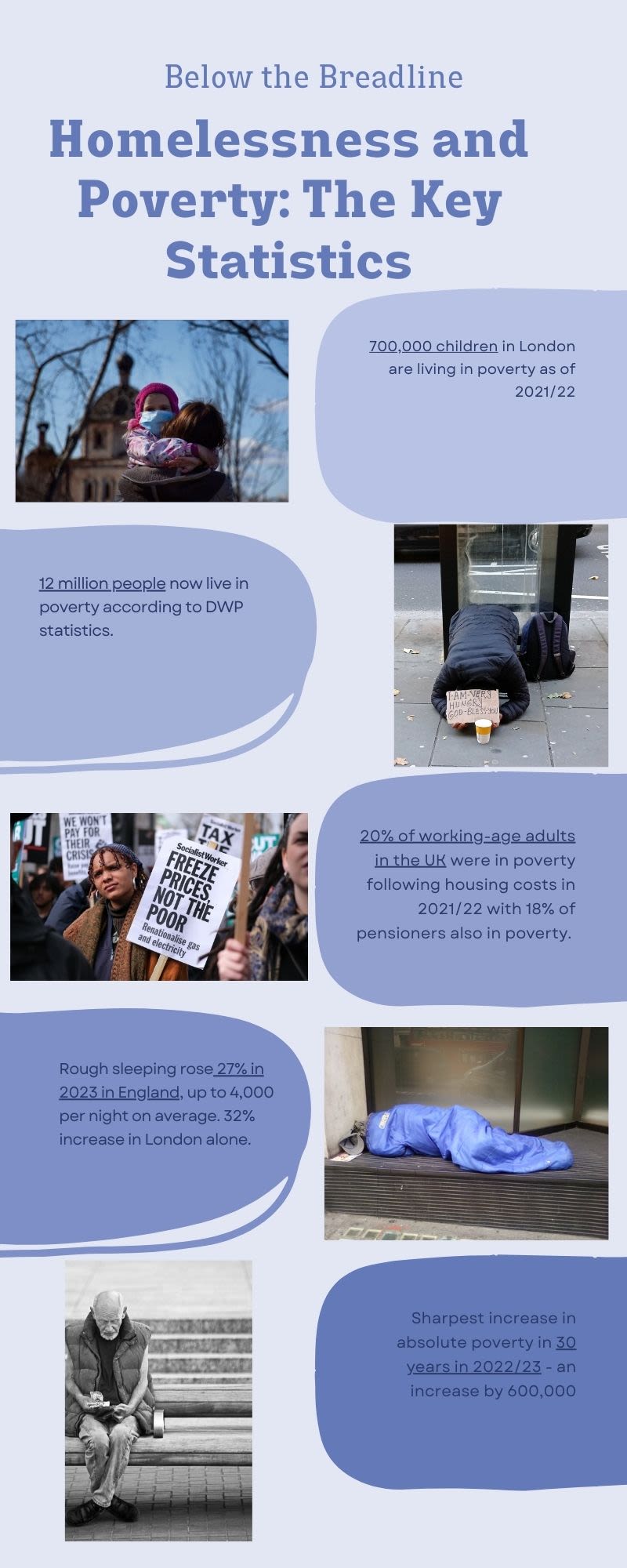
Infographic of the Key Poverty and Homelessness Statistics in the UK Child being looked after their parent when struggling in poverty Credit: www.vperemen.com. Sloane Square Begger begging for money Credit: Philafrenzy, CC BY-SA 4.0 <https://creativecommons.org/licenses/by-sa/4.0>, via Wikimedia CommonsFreeze Prices not the Poor Protest 2022 Image Credit: Alisdare Hickson on Flickr Licence. Rough Sleeper in the street Credit: Blodeuwedd on Attribution-NonCommercial-NoDerivs on Flickr Licence. Elderly Homeless Man sitting on bench. Credit: Ian Sane on Flickr Licence. Statistics Credit: Absolute poverty: UK sees biggest rise for 30 years - BBC News UK Poverty 2024: The essential guide to understanding poverty in the UK | Joseph Rowntree Foundation (jrf.org.uk) Homelessness: Number of rough sleepers up by a quarter in England - BBC News. Poverty in London 2021/22 – London Datastore
Infographic of the Key Poverty and Homelessness Statistics in the UK Child being looked after their parent when struggling in poverty Credit: www.vperemen.com. Sloane Square Begger begging for money Credit: Philafrenzy, CC BY-SA 4.0 <https://creativecommons.org/licenses/by-sa/4.0>, via Wikimedia CommonsFreeze Prices not the Poor Protest 2022 Image Credit: Alisdare Hickson on Flickr Licence. Rough Sleeper in the street Credit: Blodeuwedd on Attribution-NonCommercial-NoDerivs on Flickr Licence. Elderly Homeless Man sitting on bench. Credit: Ian Sane on Flickr Licence. Statistics Credit: Absolute poverty: UK sees biggest rise for 30 years - BBC News UK Poverty 2024: The essential guide to understanding poverty in the UK | Joseph Rowntree Foundation (jrf.org.uk) Homelessness: Number of rough sleepers up by a quarter in England - BBC News. Poverty in London 2021/22 – London Datastore
Absolute Poverty is currently defined by the Department for Work and Pensions as an individual whose income is 40% of the living standard, an average income can afford adjusting for inflation. The breadline is a term for the poverty threshold which is the minimum level of income that is deemed adequate in a country in order to be able to buy necessities.
A lot of those living in absolute poverty are either homeless or at risk of homelessness.
Among those is Andre Rostant who has been a vendor for the Big Issue for 10 years, currently selling the magazine in Carnaby Street. Vendors are those that sell the Big Issue in order to help make immediate money in order as a means to help climb out of absolute poverty.
For Rostant, the money earnt from selling the Big Issue goes on emergencies and necessities whilst also working a part-time job but he says that it is different for each vendor.
He said: “What I can tell you is that no-one does this for fun.
“People who sell the Big Issue have to do it because they have to.”
Rostant added that the majority of people understand homeless but don’t understand that a Big Issue vendor is a business and that it is not begging but is a job just like any other seller.
“People assume that people who are homeless are given stuff which they aren’t, they live on benefits, but like a lot of people in this country who work are on benefits.
“Homelessness is an aggravation of that which has been harder with the cost-of-living.”
He has also released a book on the 27th of June titled The Muffin Man which aims to tell the story of homelessness within Soho.
Vendors have an assessment with the Big Issue in terms of their ability to sell the Big Issue. There were 3,700 vendors in the UK in 2023 with 500 of them being based in London and the South East.
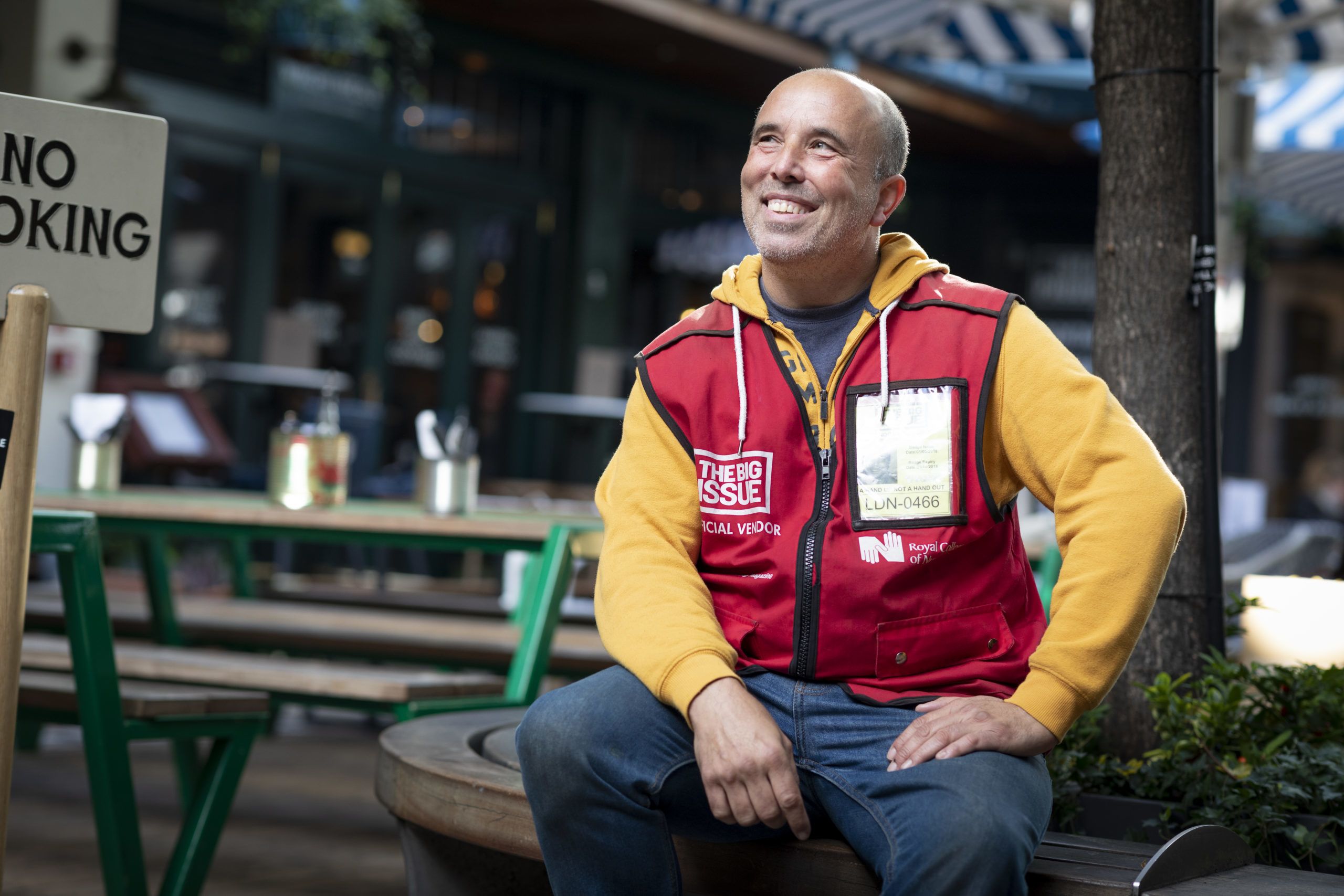
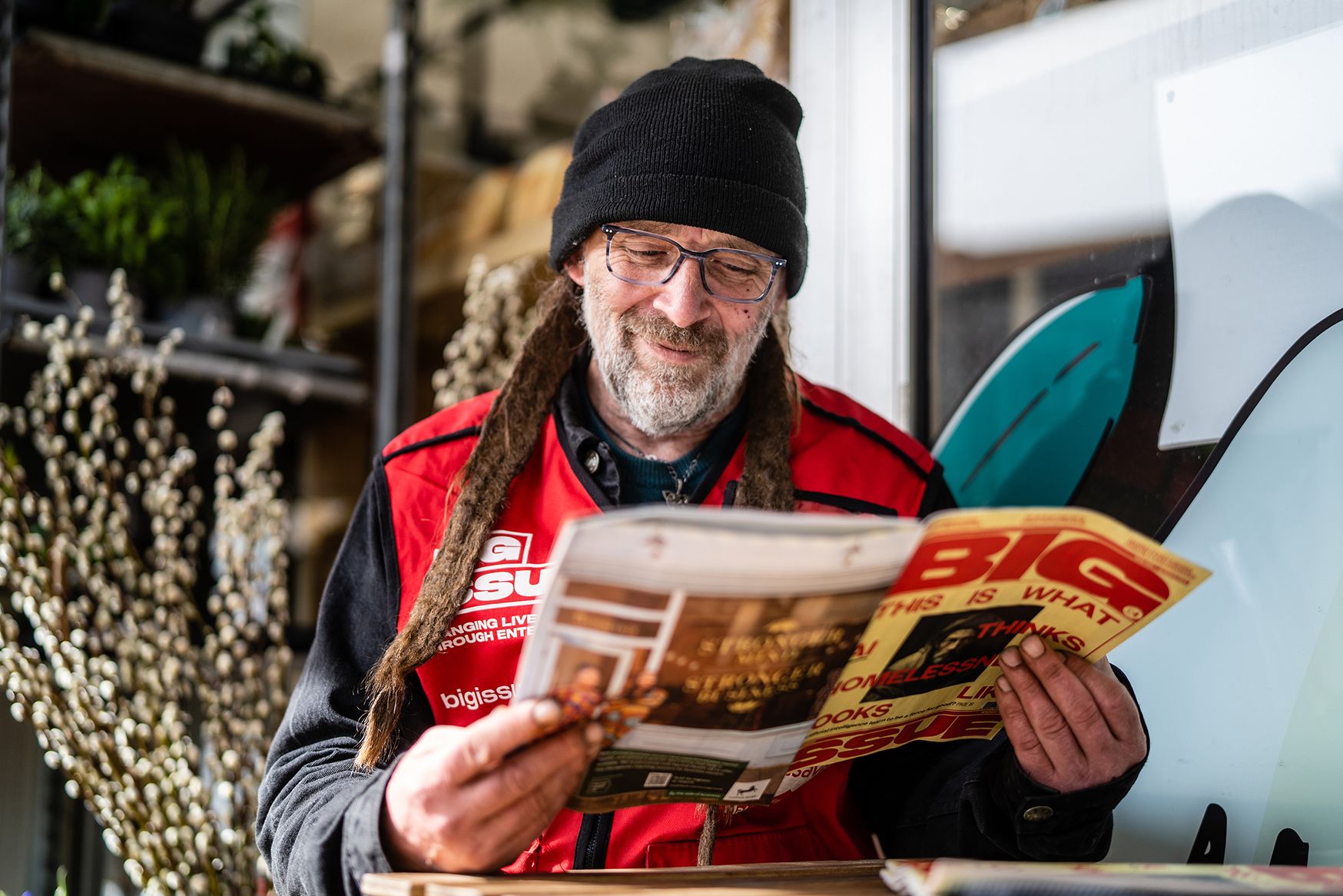

The Cover of The Muffin Man Book by Andre Rostant. Credit: Arkbound.com
The Cover of The Muffin Man Book by Andre Rostant. Credit: Arkbound.com
The Long Term Impact of Child Poverty
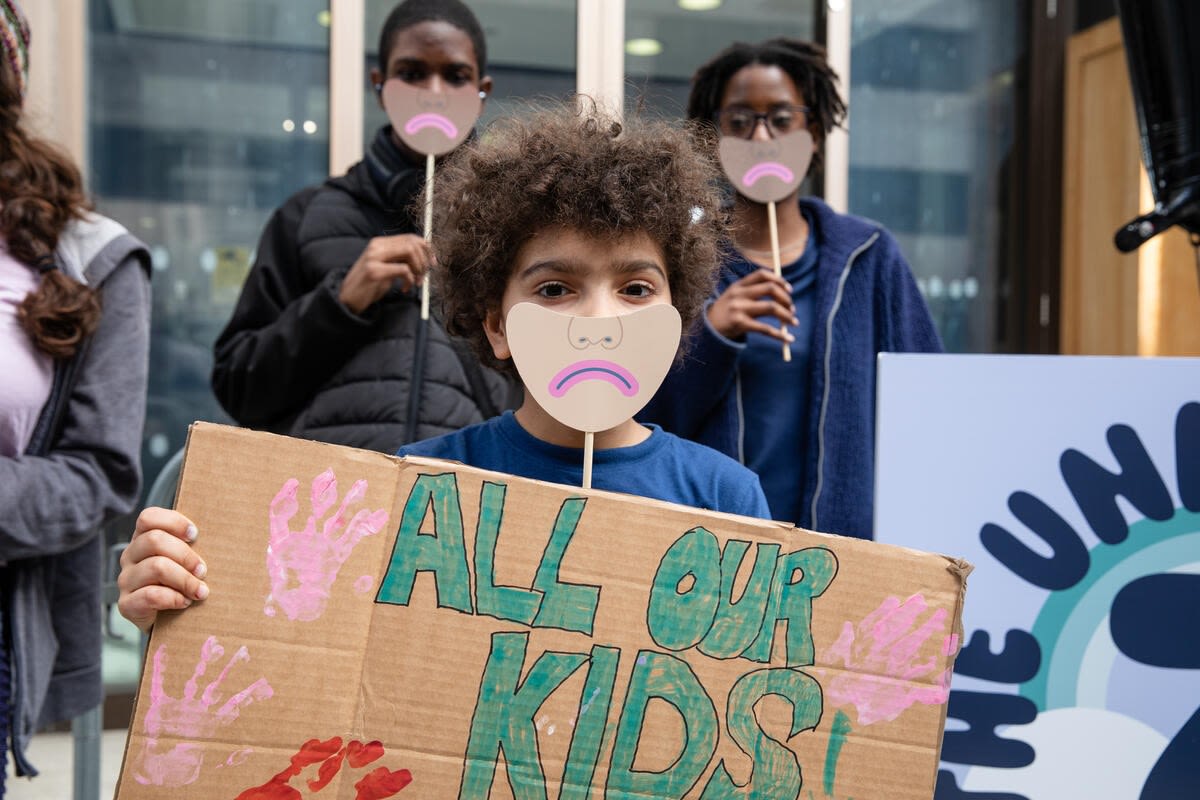
The increased cost-of-living has had a disproportionate increase in the poverty levels of children with now nearly half of families being in poverty.
Among the reasons behind the increase in the two-child benefit cap which took affect at the beginning of the 2017/18 Financial Year - the cap restricts benefits such as Child Tax Credits and Universal Credit to the first two children.
Campaigners such as End Child Poverty coalition manager Rachel Walters have argued for the scrapping of the two child poverty in which the coalition sent an unhappy birthday card to the DWP in April, calling it: “A calculated decision that has pushed costs onto the poorest and led millions into destitution.”
She also mentioned a lot of impoverished children suffer extreme mental health problems when dealing with poverty, mentioning one young person had informed her that the young person and her brother would spend the entirety of their summer holidays watching TV as their mother had to continue working so missing out on doing other things that their peers would experience.
Walters said: “They didn’t have money for a holiday or to even go to a theme park so sitting on the sofa and watching TV was their summer holidays.
“Going into their first English lesson, they had to write what they had done on their holidays and they just made something up.
“It creates trauma for feeling different to their peers and missing out on these experiences and it is sad.”
She also explained that university becomes unattainable for impoverioshed children because of the additional costs that come with university.
"There is that inner-built belief that young people that have a family to pull back on and that is not the case.
"You are limiting a person's ability to phase themselves out of poverty."
Data Sources: Local indicators of child poverty, Centre for Research in Social Policy, Loughborough University for End Child Poverty; Children in low income families: local area statistics, DWP. Chart Sources: London Poverty Profile 2023
Data Sources: Local indicators of child poverty, Centre for Research in Social Policy, Loughborough University for End Child Poverty; Children in low income families: local area statistics, DWP. Chart Sources: London Poverty Profile 2023
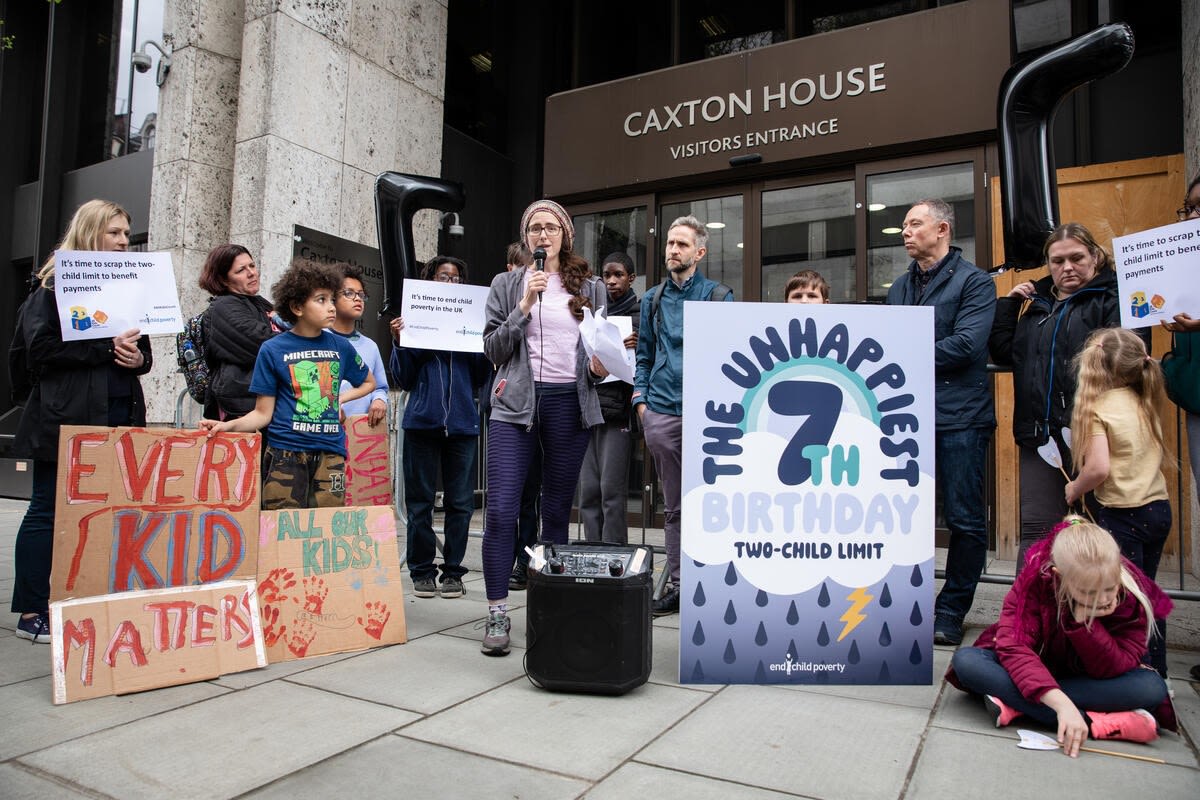
The Unhappy Birthday Card sent to the DWP by the End Child Poverty Coalition regarding the 7th Anniversary of the Introduction of the two-child benefit cap. Credit: Save the Children.
The Unhappy Birthday Card sent to the DWP by the End Child Poverty Coalition regarding the 7th Anniversary of the Introduction of the two-child benefit cap. Credit: Save the Children.
Key Homeless and Poverty Legislation

The Vagrancy Act of 1824 is the key act that outlaws rough sleeping and begging within England and Wales.
Section 4 of the revised act is the key section of the act that outlaws rough sleeping in regard to certain conditions.
Earlier this year, there was the proposed introduction of the Criminal Justice Bill which would enable an authorized person to move on an individual if they are considered a nuisance beggar.
The Bill hadn't gone through Parliament when the election was called but the Conservatives have pledged to introduce a version of the Criminal Justice Bill if they win the election.
Critics of the bill saw this as a possibility that it would criminalize rough sleeping which the government denied saying that the bill would tackle root causes of poverty.
The two-child benefit cap prevents parents claiming tax credits or universal credit for any third or subsequent child born after April 5th 2017.
A report from the Institute for Fiscal Studies estimated that an additional 250,000 children will be impacted by the policy over the next year.
Critics of the policy believe that 300,000 children would be lifted out of poverty if the cap was removed. Former Prime Minister Gordon Brown, Archbishop of Canterbury Justin Welby and Former Home Secretary Suella Braverman are all opponents of the policy.
The policy was introduced by George Osbourne back in the post 2015 General Election Budget with the aim that families on means-tested benefits faced the same financial choices as those supporting themselves solely through work.
Below is what End Child Poverty Coalition's Rachel Walters had to say on the policy.
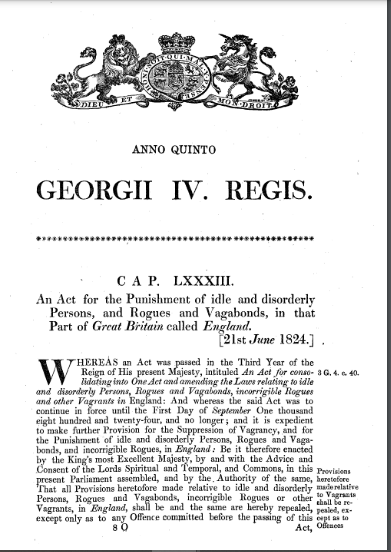
Original Copy of the Vangracy Act that officially outlawed rough sleeping and made it an punishable offence. Credit: GOV.UK
Original Copy of the Vangracy Act that officially outlawed rough sleeping and made it an punishable offence. Credit: GOV.UK
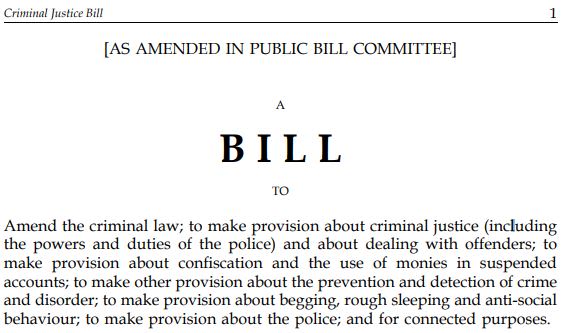
The proposed Criminal Justice Bill when it was unable to pass through the Commons for the Dissolution of Parliament Credit: UK Parliament
The proposed Criminal Justice Bill when it was unable to pass through the Commons for the Dissolution of Parliament Credit: UK Parliament
The levels of Children in Relative Poverty in the UK over time and how it differs per family in relation to the number of children that they have. Note: The Two-Child Benefit Cap was introduced at the start of the 2017/18 Finanical Year. Information Credit: Institute For Fiscal Studies using Family Resources Survey Information
What have been some of the demands in order to help those below the breadline?
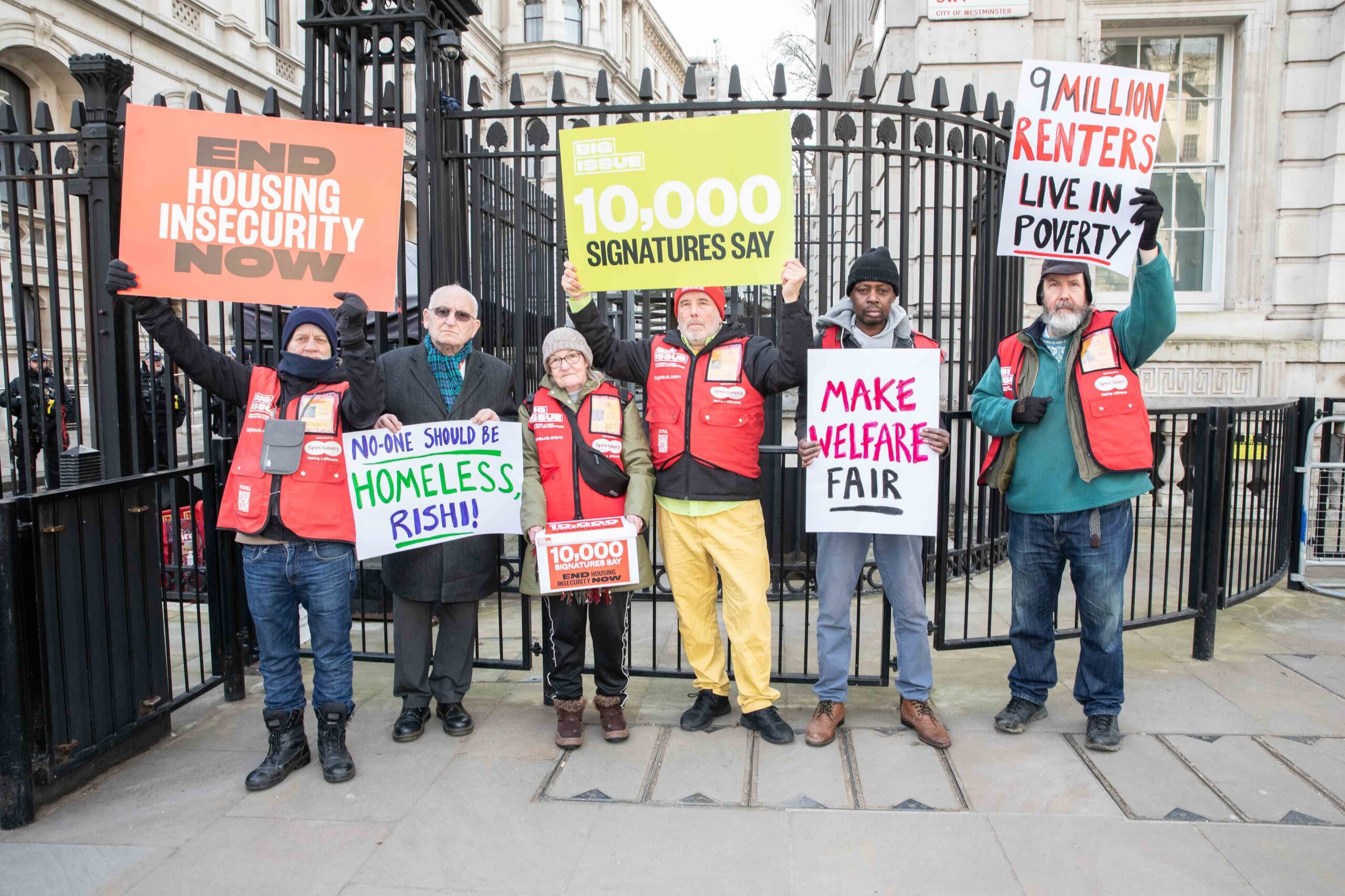
Homelessness charities and anti-poverty groups have called for an increase in homeless support in order to tackle poverty within the UK.
Big Issue's Five Pillars demands that investment in education and community initiatives are vital in order to reduce the level of homelessness seen in the UK.
Homeless Charity St Mungos have sent out an open letter calling on the three main parties to provide additional funding for homeless services such as the Rough Sleeping Initiatives whose funding is due to end in April 2025.
The letter stated that homelessness is a political choice and that any cuttings to their funding could see a third of their projects being forced to close.
Head of rough sleeper services Hannah Faulkner said: "Whichever party gets in needs to address the housing need in order to help reduce homelessness and poverty within London."
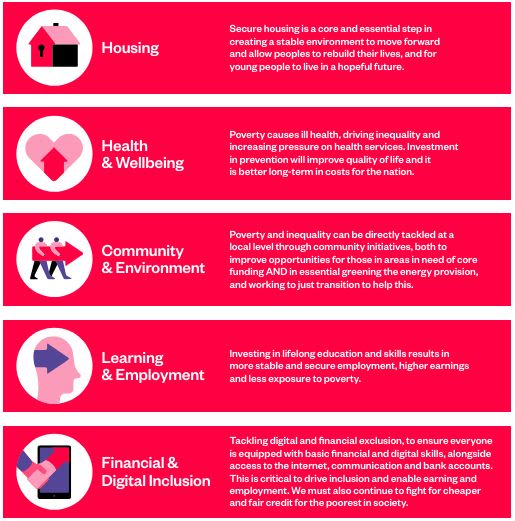
The Big Issue's Five Pillars in order to tackle poverty. Credit: The Big Issue.
The Big Issue's Five Pillars in order to tackle poverty. Credit: The Big Issue.
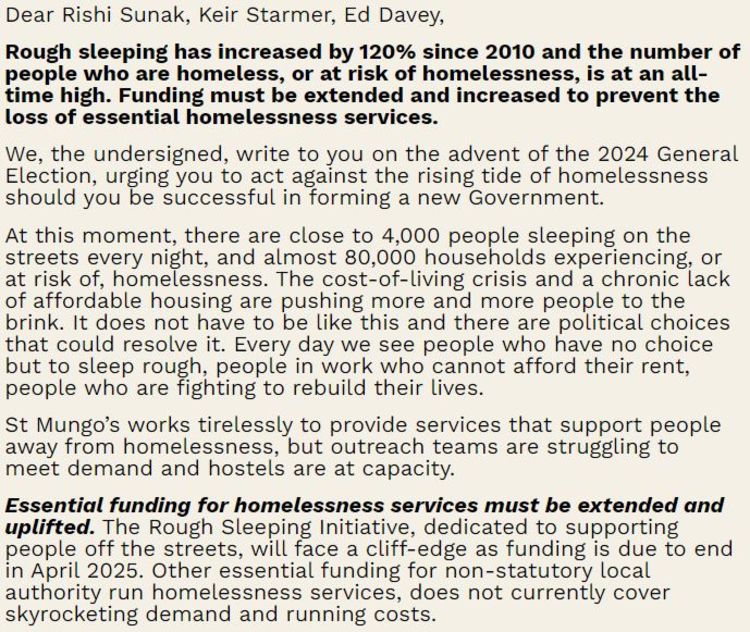
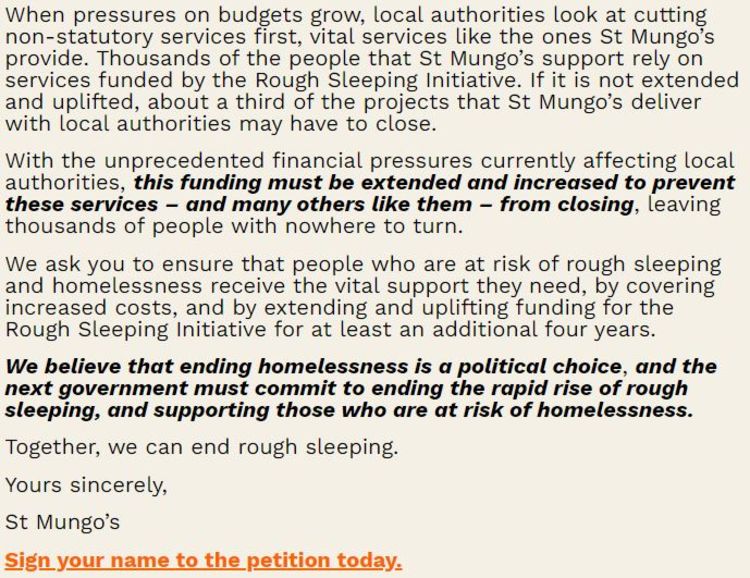
The Open Letter to the Major Party Leaders in order to prevent homelessness. Credit: St Mungos.
The Open Letter to the Major Party Leaders in order to prevent homelessness. Credit: St Mungos.
What are political parties pledging to do in order to tackle absolute poverty?
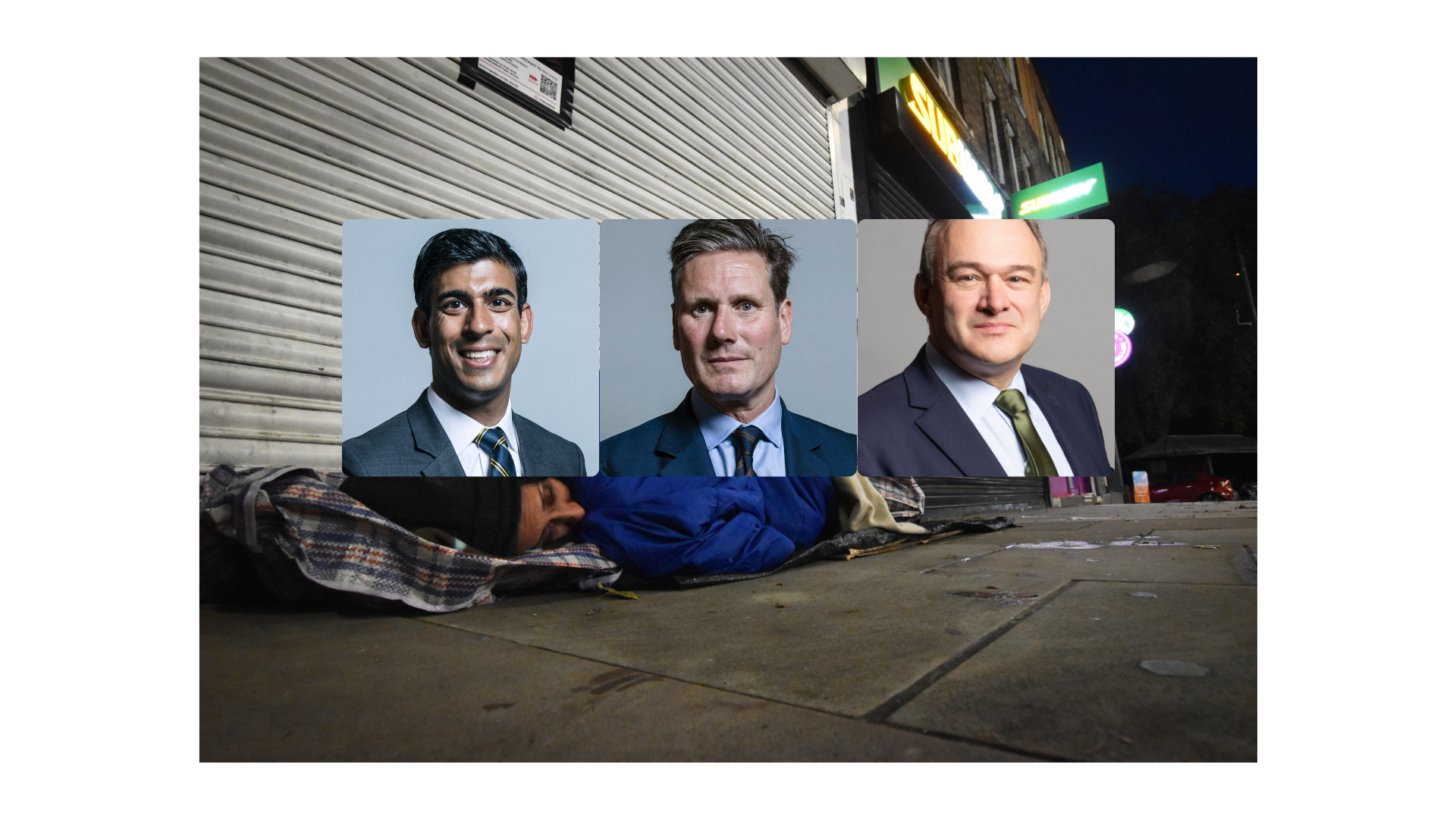
The Conservative Party had promised an end to rough sleeping and for people to end up in the street. They also pledge to build 1.6 million homes by the end of the next Parliament. They pledged to keep the two-child benefit cap with Sunak stating in April: "Working families do not see their incomes rise when they have more children. Families on benefits should be asked to make the same financial decisions as those supporting themselves solely through work.”
The Labour Party have stated that they wish to tackle child poverty as part of their "Making security the foundation of opportunity" mission as one of their five missions in July 2023 as they say it is a way in which to increase opportunity for everyone in the country. The party’s leader Keir Starmer has said that his aim was to remove poverty by the thousands over the course of the Parliament. However, they have been criticized for pledging to keep the two-child benefit cap that has been in place since 2017 which Starmer has defended by saying that he didn’t have the resources to do so. He did claim that when resources would increase, he would get rid of the policy.
The Liberal Democrats have pledged to scrap the Vagrancy Act in its entirety as well as building up to 150,000 social houses per year as part of a 380,000 homes a year programme. They have also pledged to ban no-fault evictions.
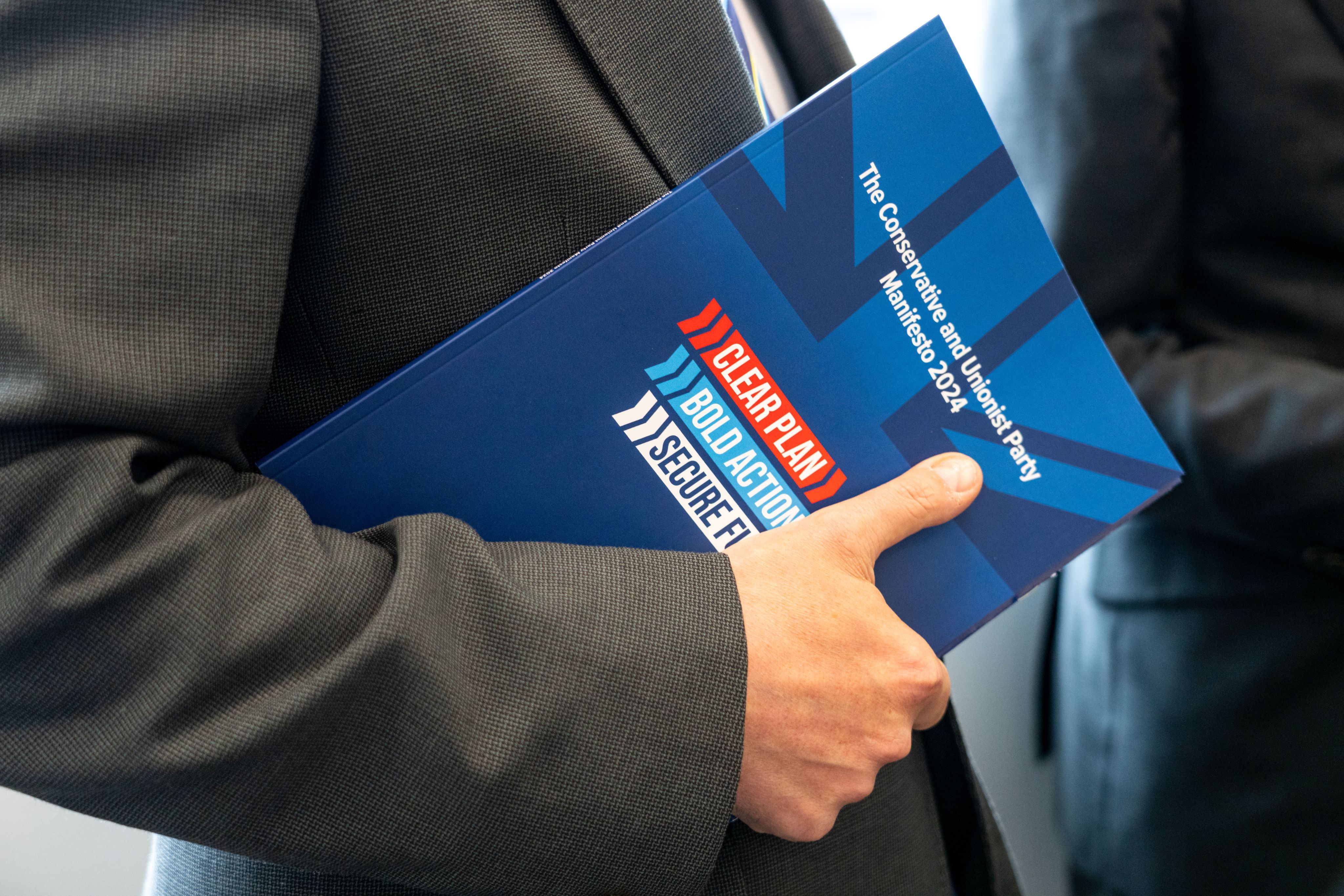
The Conservative Party Manifesto after the campaign launching. Credit: Ed Massey CCHQ on Flickr Licence
The Conservative Party Manifesto after the campaign launching. Credit: Ed Massey CCHQ on Flickr Licence
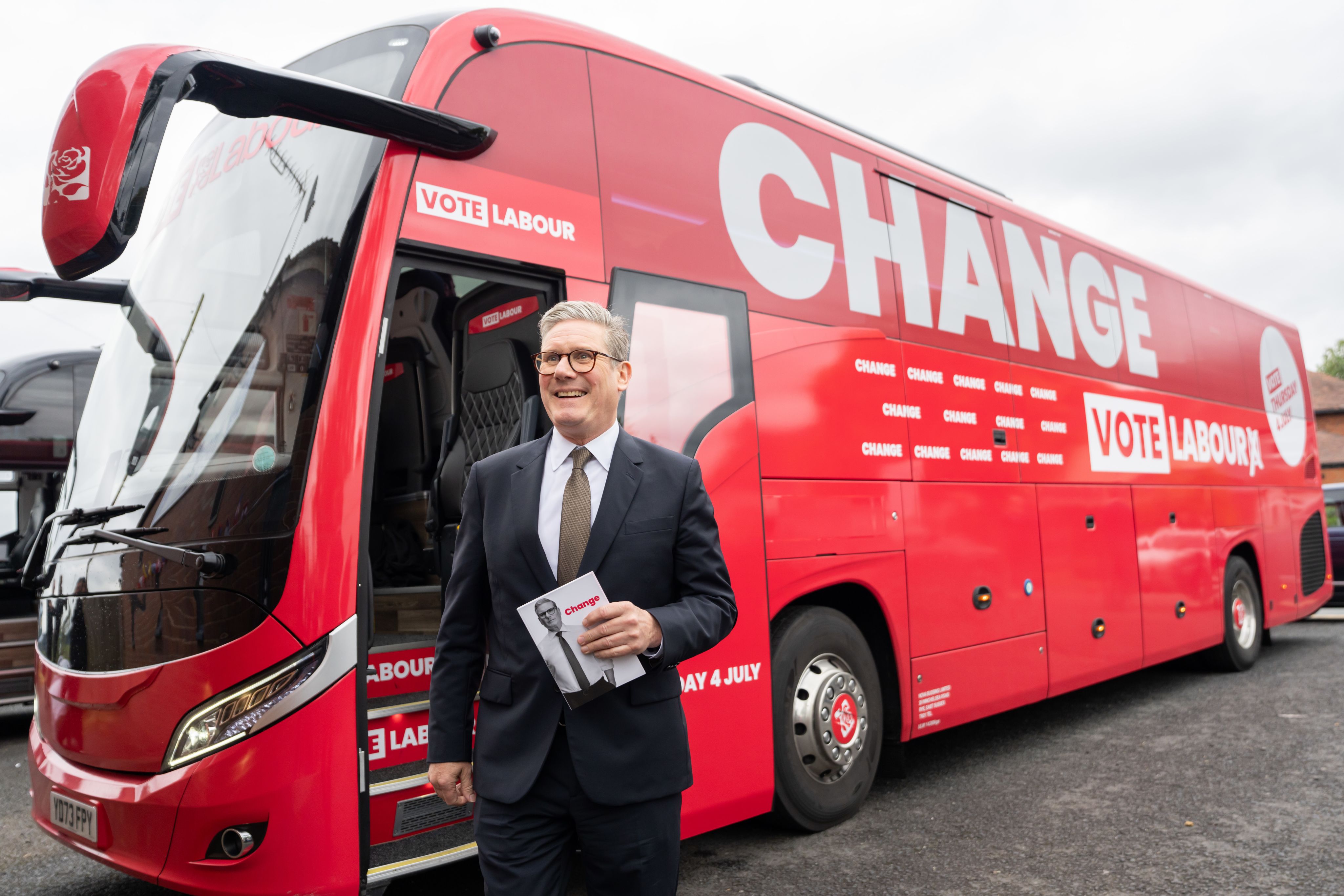
Keir Starmer in front of his Change Bus at the launching of Labour's 2024 General Election Campaign. Credit: The Labour Party on Flickr Licence
Keir Starmer in front of his Change Bus at the launching of Labour's 2024 General Election Campaign. Credit: The Labour Party on Flickr Licence

Official Portrait of Ed Davey Credit: Chris McAndrew / UK Parliament Wikicommons Creative Commons Licence List.
Official Portrait of Ed Davey Credit: Chris McAndrew / UK Parliament Wikicommons Creative Commons Licence List.
